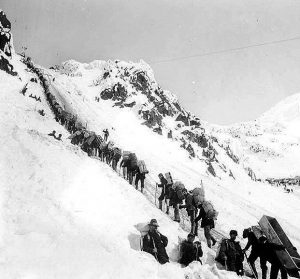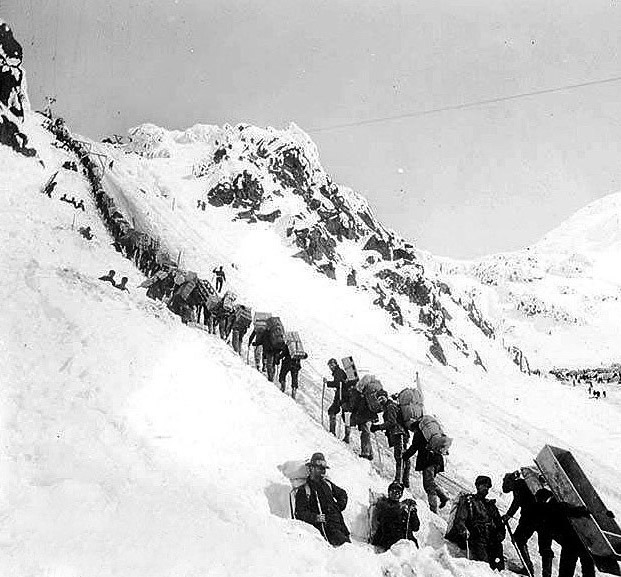Quit your job, find Gold!!!
Article written by John Davis

Can anything stir the thrill of adventure, or be more of a false god, than gold fever? It was George Cormack, or “Lying George” to fellow Alaskan miners who’d heard enough of his false gold claims, who had vision. Having lived among the Alaskan native Siwash tribe for years, he dreamed one night of catching two gold finned salmon, with golden nuggets for eyes. He, like his native friends, believed. While fishing with his tribal friends one day he found…real gold nuggets. So began what years later became known as the Klondike Gold Rush. A rush for sparkling creeks laden with gold emptied whole towns as adventurous young men departed in droves for the Siren song of wealth beyond their most fevered dreams.
One such youth was (name lost to history, but believed to be Howard) Powers. Drawn like one called by the alluring death maiden Circe, the enchantress of golden wealth, he soothingly imagined her call his own name. Abandoning daily employment Powers, like waiters in hotels, horse groomers, painters, and other workmen, he literally dropped tools and headed north to the frozen regions of Alaska and Canada. And what did they find?
It is estimated that of the 100,000 who departed, some four thousand dreamers actually found gold. Of those, perhaps a couple hundred could consider themselves rich. Powers was not one of them. Yet, he had sufficient wealth, and more than sufficient youth and energy, to wander yet further in search of more adventure.
Now enters ‘Hell Roaring Mike’ Healy. Michael Augustine Healy was a young man born into Georgian slavery. His Irish father and mixed race mother sent their nine surviving children north to New York for a formal education, and to escape slavery. Healy became the very first ever African-American commander of a US Government vessel, the fabled US Coast Guard Cutter Bear.
Healy’s life deserves a book in itself. He, as the quite literally only representative of US law in the ‘Seward’s Folly’ of the great Alaskan territory, did Homeric deeds. He patrolled over 20,000 miles of coastline. He refereed conflict among the many tribes located there. He sought or provided food, medical, and legal assistance when needed. His efforts led to the first communication infrastructures. Healy commanded his ship the Bear as a commissioned officer of the US Government. His was the only legal basis for establishing courts of law among rowdy, untamed, and unregistered immigrants, escapees, criminals and future citizens. He returned deserters to ships, criminals to justice, and husbands to wives. Healy often served as judge on his own deck. His understanding and help for the natives along the massive coast was remarkably humane for his era.
The natives came to respect him, and he for them. Had he done nothing else, he determined something must be done to save a starving string of native settlements one year when all food sources were over-killed by wanderers, poachers, bad luck and extreme weather. Healy learned that reindeer had been tamed in Siberia, by native tribes across the pounding Alaskan seas and Bering Straight. So, he set forth. At his own expense, he sailed the Bear to Siberia. Healy managed to gain the trust of the Siberian tribesmen such that he bought enough reindeer to save the lives of his suffering ‘constituents’ along the Alaskan coast. The rebirth in America of a whole culture of survival off reindeer meat saved the day.
And it was on one of these missions to the heart of Siberian wastes that Healy and Powers’ paths crossed. Powers, after years of trying to find the elusive metal, moved on from the Klondike and Alaskan gold creek beds. We don’t know if he heard of another gold strike…just beyond reach, or not. We know, however, that as Healy sailed down a distant Siberian river which fed into the Bering Sea, he was astounded to see an American flag flying in the distance. As the only official representative of distant America in this entire region of the world, Healy discovered an outpost run by an American expatriate….Powers!
Powers had a tale to tell. He’d learned what most miners discovered only the hard way. The way to make money in remote regions is not the discovery of gold, but by selling day to day hardware, food, and daily necessities to miners, dreamers, settlers and wanderers alike. He’d encountered a success of sorts in his little village far up a remote river which fed into frigid coastal waters of the Bering Sea..
So time went by. Later, the Bolsheviks were active across the vast Russian steppe, tundra, and wilds of Siberia. They sought to antagonize those not in line with their new political philosophy. White Russians confronted the ‘Red Bolsheviks’, and in the turmoil reports circulated that ‘an American had been killed.’ As one of the few known Americans in the forbidding villages of northeast Siberia, a US Government expedition set out to find Powers, an American citizen. He wasn’t dead, just tending shop in his Siberian village trading post. After a life abroad, he decided to come home to the country he hadn’t seen in decades. He sailed home to Oakland, California, on the US Coast Guard Cutter, Bear.
~Written by MW Team Writer: John Davis
 John William Davis is a retired US Army counterintelligence officer and linguist. As a linguist, Mr. Davis learned five languages, the better to serve in his counterintelligence jobs during some 14 years overseas. He served in West Germany, Italy, and the Netherlands during the Cold War. There he was active in investigations directed against the Communist espionage services of the Soviet Union and Warsaw Pact. His mission was also to investigate terrorists such as the Red Army Faction in Germany, the Red Brigades in Italy, and the Combatant Communist Cells (in Belgium) among a host of others.
John William Davis is a retired US Army counterintelligence officer and linguist. As a linguist, Mr. Davis learned five languages, the better to serve in his counterintelligence jobs during some 14 years overseas. He served in West Germany, Italy, and the Netherlands during the Cold War. There he was active in investigations directed against the Communist espionage services of the Soviet Union and Warsaw Pact. His mission was also to investigate terrorists such as the Red Army Faction in Germany, the Red Brigades in Italy, and the Combatant Communist Cells (in Belgium) among a host of others.
His work during the Cold War and the bitter aftermath led him to write Rainy Street Stories, ‘Reflections on Secret Wars, Terrorism, and Espionage’ . He wanted to talk about not only the events themselves, but also the moral and human aspects of the secret world as well.
 And now recently published in 2018, John continued his writing with Around the Corner: Reflections on American Wars, Violence, Terrorism, and Hope.
And now recently published in 2018, John continued his writing with Around the Corner: Reflections on American Wars, Violence, Terrorism, and Hope.
Two powerful books worth reading.
Click to Read John’s Complete Profile


Thank you for doing this post, Jenny. I enjoyed it.
Thanks Jenny and John, great story. The Klondike gold rush was a true test of endurance and determination. That is one story that I would have loved to have been a part of. Dawson City, still to this day, is one of unmatched character. Just ask any of the ladies at Diamond Tooth Gerties, the gold is easily garnered if you know the ropes.
That was a great story John, it made me think of the chase, we are all looking for gold but the true treasure lies in the journey itself…..
“Treasure hunting is not always about finding the riches and gold,
Sometimes it’s more about the riches that your journey beholds”
Thank you Jenny for all that you do and thank you John for your story of adventure. Have a great day everyone… until next time… see ya my friends..
Thought of the chase as well. What were people’s priorities back then? today? They had jobs and necessities of living but dropped everything to ‘become super wealthy’. How similar sounding. But I think it is not about venturing out to find riches that journey beholds; I think it is about finding riches that one already holds and does not appreciate enough – to be lured to drop everything in a hope of wealth. My ancestors came to this country not based on gold, riches, but a chance to survive. My grandfather was one of only three of 13 children to survive. The three surviving were in the US when the American dream was at Maslow’s lowest level of the heirachy. Powers seems to have learned the hard way – he learned and survived – but in the end, it was not gold nuggets he sought. The other gentleman served others. I do not think that he sought golden nuggets or ‘metal’ as was used in the story. Their lives crossed and then parted. So, which path to take? When is it time to realize that another patch should be accepted? I believe the journey was ‘hard’ for both men but the one man stayed on the journey to serve others and the other man began the journey to serve self. Both served others. If this story makes you think of the chase, do you connect with either man’s journey? BTW, I seriously love the writing and author style – That is a major compliment to John because I am rather critical to the extreme. I intend to secure his writings to devour his message(s). Thanks for the story, Jenny.
Dear Pen Ghost,
I greatly appreciate the compliment. My hope is that you completely enjoy my books, which are designed not to be read at a sitting, but rather to be reflected upon. This is why ‘Reflections’ is in my sub-title. I’ve found that looking back on experiences, like those you describe above, causes a person to see more than the original event brought about. Here’s wishing you all the best!
Even back then there were rules. Before a prospector could enter Canada he was required to have a TON of supplies with him. Think about that for a minute. https://en.m.wikipedia.org/wiki/Chilkoot_Trail#Klondike_supply_list
The hardships these guys dealt with were unimaginable in today’s society. Once they made it, if they made it, over the passes the biggest obstacle was the Yukon river. There they built wooden rafts, loaded the supplies and put in the most dangerous leg of the journey. The Yukon being almost 2,000 miles long was a huge river. The rafts they built were almost uncontrollable in the powerful currents. The “sweeps” or overhanging trees along the banks took these homemade rafts out by the thousands. If they did make the journey the next obstacle was preparing for the long cold winter. Yeah these guys were tough, true grit, grizzly bear donned mountain men the likes of which are beyond comprehension today. I have nothing but respect for those like these that went for it, the adventure of a life time.
I concur with your thoughts, Strawshadow.
Hello Strawshadow. Slightly going off track a little from the topic on hand. Did you watch the program on the History Channel called “Men Who Changed America”? I found it quite interesting.
Hello pdenver, no I did not see it. Do you mean the men who “built” America, the miniseries? I will keep an eye out for it though;)
Gosh Strawshadow, now I feel embarrassed. The miniseries is/was called “Men Who Built America”. I placed a sticky note on the bottom of my computer screen so that I wouldn’t forget, and I wrote it exactly as follows:
Wednesday
new episode
“Men Who Changed America”
I still have the sticky note hanging at the same place I originally placed it. The title may have been wrong, but thank goodness I knew what I meant. 🙂 I enjoyed the miniseries and learned some things I never knew about some of the people. Sacajawea was mentioned in one of them, and I found it interesting how they went over the Rockies in one month, but during this time, they ran out of food and at one time ate candles. At least this is what was reported in this particular series.
Thank you for the correction, Strawshadow. 🙂
Many extraordinary women of various trades joined the Klondike Gold Rush. I guess that’s seen as a sidebar but I see it as an important unknown part of telling the whole story you’ve introduced to us.
http://www.whitepinepictures.com/seeds/ii/14/sidebar.html
The side bar is the best place to be Amber, cause that’s where they make the rules, any guy knows that. Besides we also know that all women are extraordinary, of course this is my opinion. Thanks for the link, it was most enjoyable.
Well said, Amber. I’m astounded by how women impacted history which, regrettably, is not often recorded. That’s why there is a whole world out there for future historians to assess…to answer the questions such as you introduce here. Thanks for your note!
The Bear took him out and away. g